Teweles Seed Tower Has New Owners, Renovation Planned
Plus: A recap of the week's real estate news
A highly-visible Milwaukee building has a new owner. The Teweles Seed Tower apartment complex was purchased by a partnership of Chicago-based R2 Companies and Los Angeles-based Concord Capital Partners for $9 million.
The partners are planning a substantial renovation of the Walker’s Point building, which has watched the area around it transition from underutilized industrial buildings to high-end housing and corporate headquarters in the past two decades.
Starting in 2004, a partnership of CommonBond Communities and Schultz Development Group redeveloped the disused industrial complex into a 115-unit, mixed-income apartment building. Approximately 50% of the units are set aside at below-market rates through the low-income housing tax credit program.
But as those credits expire in the next four years, the new owners will transition the building to entirely market-rate housing.
“We are big believers in the Third Ward and Walkers Point,” R2 CEO Matt Garrison told Sean Ryan in an interview. “Teweles Seed Lofts represents an opportunity to buy apartments at an attractive basis that is far below replacement cost and ultimately pass this along to tenants in the form of great value.”
If you look out the windows on the upper floors, you can see Garrison’s other area investments. A few blocks to the west is the six-building The Tannery office complex, which R2 purchased in 2018 for $25.4 million. Look northeast towards the Historic Third Ward and you’ll see the five-story office building at 214-228 E. Erie St. that R2 purchased in 2019 for $9.65 million. Look further north and you can see the ASQ Center, 648 N. Plankinton Ave., that R2 purchased with Hempel Companies in 2018 for $19.9 million.
The space between R2’s investments and the Teweles building has seen dramatic change since the seed complex was converted to housing. The Global Water Center is immediately to its north, Rite-Hite is opening its new headquarters immediately to the west, S. 2nd St. has boomed with new investment to the southeast, the Harley-Davidson Museum was developed to the northwest and to the northeast a cluster of high-end condominiums were developed along the Milwaukee River. A number of smaller apartment buildings dot the area.
Teweles Seed was a family-owned company for four generations before being sold in 1972. The Milwaukee company pioneered, at least for its industry, a number of things now taken for granted, including advertising on the radio and selling seed in smaller bags. Current online reports list it as peaking at the second-largest forage seed company in North America, but without attribution.
How do you say the name of the building and former company? Teweles is pronounced two-lees.
Photos
Weekly Recap
Schuster’s Returns to King Drive
Schuster’s is back. Well, sort of.
There are no plans to reopen the long-gone department store, but, for the first time in decades, you can see the facade of its former flagship store, 2153 N. Martin Luther King Jr. Dr.
The contracting partnership of CG Schmidt and JCP Construction has made substantial progress on removing the metal panels that shrouded the former department store since 1984. Work began in late June. The effort is part of a $105 million ThriveOn King project that will turn the department store complex, long used for storage, into a mix of housing, office space and community-focused commercial space.
Spec Industrial Building Approved
The Milwaukee Common Council gave final approval Thursday to a proposed industrial building for the Menomonee Valley.
Westminster Capital announced plans earlier this year to construct a 180,469-square-foot industrial building as a speculative investment, hoping to land one or multiple tenants.
“We feel very confident that there will be demand for a property like this, especially in the Menomonee Valley,” said Westminster vice president Matthew Van Wie to the Zoning, Neighborhoods & Development Committee in June. “Obviously we think there is an opportunity here with it being one of the last sites in the valley where we can assemble enough land to build a building of this significance.”
The Trade Hotel Tops Off
The new hotel rising over Fiserv Forum and the Deer District has reached its highest point.
The Trade hotel project’s partners held a topping-off ceremony Wednesday morning, signing, lifting and installing the highest steel beam in the nine-story hotel.
The hotel will be a Marriott Autograph Collection-branded hotel, with restaurants on the first and ninth floor and a large ballroom on the second floor. The ninth-floor restaurant and bar will have a rooftop deck overlooking the NBA arena and downtown skyline.
Middleton-based North Central Group (NCG) is developing the 207-room, high-end hotel on land the Milwaukee Bucks acquired from Milwaukee County for $1 as part of the arena’s subsidy agreement. Firm vice president Andy Inman said it was a great day for NCG and thanked the more than 75 construction workers that are on-site daily building the project. Noting that hospitality is about telling a story, he said The Trade name is a reference to Milwaukee’s industrial history.
Last Home in Foxconn Site Could Be Sold
Kim and Jim Mahoney had lived at their Mount Pleasant home for less than a year before they learned Foxconn was coming to town.
Now, five years after the Foxconn plan was announced, the Mahoney’s remain in their house — but not for long.
On Monday, the Mount Pleasant Village Board discussed the sale of their property, 10640 S. Prairie View Dr., during a closed session. The board didn’t take any action, but it’s the first time the sale has been discussed since the massive and ultimately ill-fated development was announced in 2017.
The couple said they’ve made attempts to sell the home in the past, but they accused the village of giving them low-ball offers.
IKON Hotel Deal At Risk of Default
The City of Milwaukee could end up the owner of the former Milwaukee Mall as a proposed hotel redevelopment has not proceeded.
The Haywood Group is at risk of defaulting on a $4 million loan that was to be used to develop the IKON Hotel in the former Sears department store. The Comptroller labeled the loan a “significant risk” when it was introduced in 2019 and the city has since given Haywood a one-year deferral on repayment.
City officials are expected to tour the building, 2100 W. North Ave., and meet with developer Kalan Haywood in the coming weeks, said Department of City Development project manager Lori Lutzka. The building sits on a six-acre property at the busy intersection of W. North Ave. and W. Fond du Lac Ave.
The project calls for the three-story, 211,298-square-foot building, constructed in 1928, to hold an 82-room hotel on its upper floors. An addition would be built to house a conference center along W. North Ave. Multiple tenants were considered for the first floor and future buildings were contemplated as part of a larger One MKE Plaza project.
Good Hope Rd. Pick ‘n Save Sold For $20 Million
A building occupied by a Pick ‘n Save grocery store on Milwaukee’s far Northwest Side has a new owner at a notable price.
Florida-based L2 Partners purchased the 10.74-acre property at 7401 W. Good Hope Rd. for $20 million according to state real estate records. The company is “exclusively focused on pharmacy, grocery, medical, and value add opportunities” according to its website.
Cincinnati-based Kroger will continue to own and operate the grocery store in the leased 102,000-square-foot building. A listing on real estate service Loopnet says Kroger invested $1 million in the building in 2017, then saw sales increase 36% in five years.
The sale price was nearly double the property’s $10.87 million assessment.
Zoning Changes Could Grow City Population
How will Milwaukee achieve Mayor Cavalier Johnson‘s vision of attracting one million residents in the city?
The Department of City Development is proposing to study modifying the zoning code to encourage more housing development. That could include things like allowing higher density housing along transit corridors and simplifying or eliminating the special approval process for accessory dwelling units (carriage units).
“We have the kind of zoning code that a lot of cities are emulating,” said DCD city planning manager Sam Leichtling to the Zoning, Neighborhoods & Development Monday. “That said, as the code evolves we know we can make changes around the mayor’s goals of growth, transit-oriented development.”
The zoning code was last substantially updated in 2002 under Mayor John Norquist, but recent planning efforts have identified potential areas for improvement.
Milwaukee’s Racial Disparity in Homeownership Growing
Milwaukee has larger racial disparities in homeownership than 10 other peer cities across the country, according to a new report from the Wisconsin Policy Forum. The disparities have worsened over the last 12 years since the Great Recession.
Using the U.S. Census Bureau data covering the five years from 2016 to 2020, the report found that 55.8% of the white population owned their homes in Milwaukee, in line with other cities at 55.8%. Among Hispanic residents, 38.5% owned their homes, the third-lowest rate among the cities in the comparison. The number of African Americans who owned their own homes in Milwaukee, the rate was 25.2%, the lowest among the peer cities.
Milwaukee is often called both the state’s economic engine; it is also one of the most segregated cities in the country. “Such differences may relate to the economic characteristics in the group of peer cities and some of those factors may lie beyond local housing stakeholders’ immediate control,” the report found. “At a minimum, these findings suggest that advancing racial equity in homeownership is both urgent and difficult in Milwaukee.” Peer cities used in the analysis included Albuquerque; Baltimore, Cleveland, Detroit, El Paso, Fresno, Kansas City, Memphis, Tampa, and Tucson.
The report also found that since the Great Recession and the subsequent foreclosure crisis, homeownership in Milwaukee had the third-largest decrease in homeownership for Black and Hispanic residents of the 11 cities, 6.8%. While the number of Black households in Milwaukee increased 2.3% since 2010, Black homeownership declined by 24.6%.
City Seeking Affordable Housing Developers Who Need Funding
Have a proposal to create affordable housing in the city of Milwaukee? The City of Milwaukee would like to hear from you.
Last fall, the Common Council allocated a record $10 million to the Housing Trust Fund from the city’s American Rescue Plan Act. The amount eclipses the approximately $8 million the fund has received across its entire 15-year history.
Now the city is looking for projects to support.
Plan for Kenosha Casino Sparks Debate
A relaunched effort to build a casino in Kenosha is once again stirring a response from the community after a similar proposal was rejected in 2015.
On Tuesday last week, Bristol’s Village Board unanimously approved a $15 million sale of 60 acres of land to the Florida-based Hard Rock International. Plans for the project include a casino, music venue, hotel and a Hard Rock Café.
The Menominee Tribe would own and operate the facility if it is approved by local, state and federal officials. The tribe would use revenues to pay for local services.
“It’s going to assist the tribe in meeting a lot of our unmet needs, as it comes to … health care, education, housing, those types of things that we’re challenged with here on our reservation,” said Ronald J. Corn Sr., the Menominee Tribe chairman.
If you think stories like this are important, become a member of Urban Milwaukee and help support real, independent journalism. Plus you get some cool added benefits.
Plats and Parcels
-
New Third Ward Tower Will Be Milwaukee’s Priciest
 Mar 3rd, 2024 by Jeramey Jannene
Mar 3rd, 2024 by Jeramey Jannene
-
New Corporate Headquarters, 130 Jobs For Downtown
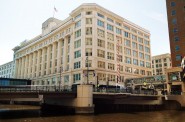 Feb 25th, 2024 by Jeramey Jannene
Feb 25th, 2024 by Jeramey Jannene
-
A Four-Way Preservation Fight Over Wisconsin Avenue
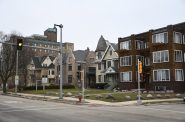 Feb 18th, 2024 by Jeramey Jannene
Feb 18th, 2024 by Jeramey Jannene


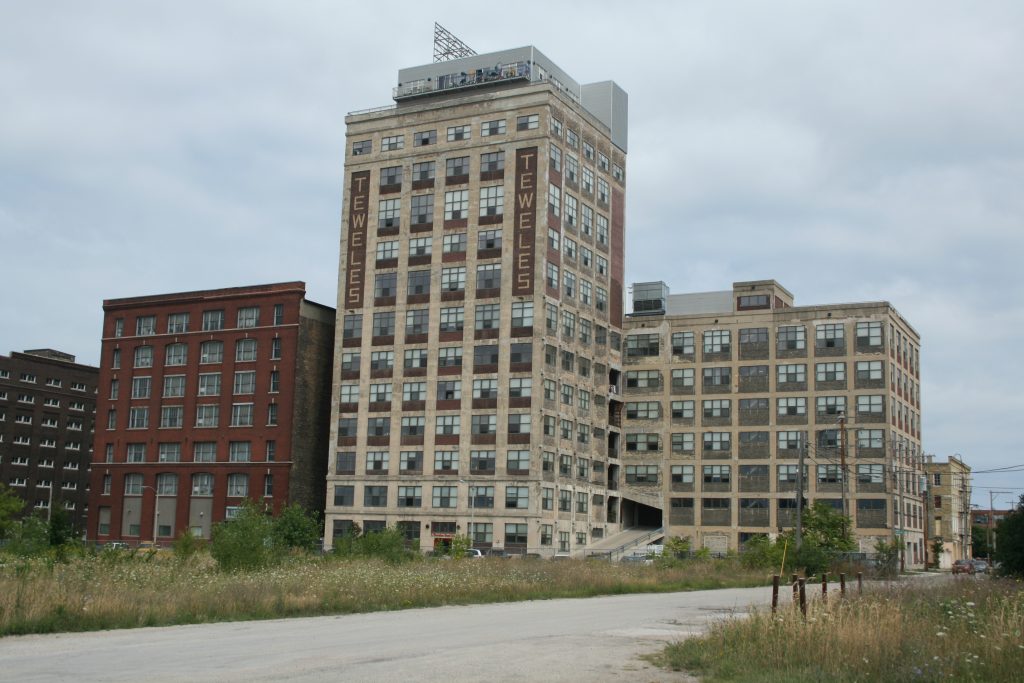
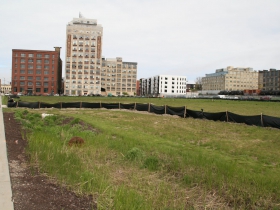
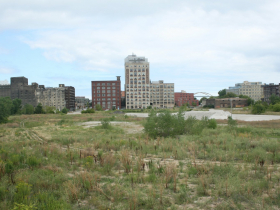
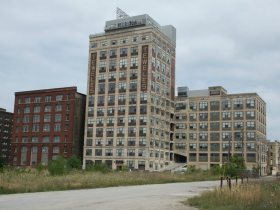
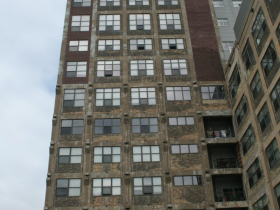
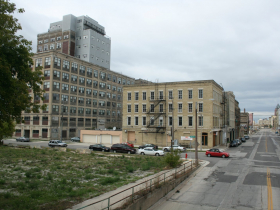
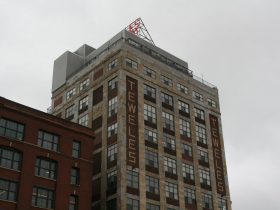

















Tell that stupid FIB Matt Garrison to go back to Illinois.